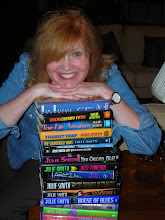I seem to be undergoing an identity crisis. This blog, originally meant to chronicle electronic adventures, will henceforth address itself also to the larger issues (and non-issues) of the literary world, since it develops that twice in a week I've been unable to resist. Even Mike Shatzkin, the 600-pound gorilla in the e-pub world, sometimes talks about baseball. So this guerrilla feels free.
Let us now give our attention to a piece in the New Republic by a staffer named Chloe Schama, in which Ms. Schama wonders why no "major literary figures" have tackled the aftermath of Hurricane Katrina, in sharp contrast to the way they wrote about 9/11. "In fact," Ms. Schama writes, "the literary response to Hurricane Katrina has been almost non-existent."
As a New Orleanian, I'd have to agree that there isn't nearly enough post-Katrina lit out there, but I'd submit first that there's a lot more than Ms. Schama seems aware of and second, that the fault may not lie so much with the writers as with the prevailing attitude of New York editors and possibly agents. I think we should establish that she's talking about fiction, although she is grateful for Dave Eggers' Zeitoun, which isn't fiction. Actually, she just seems grateful that a writer of Eggers' stature took on the issue. But I think what she's missing is that there are probably only three writers she'd probably consider "major literary figures" who are actually qualified to write a credible Katrina novel.
New Orleans being the extremely tricky and many-layered can of worms it is, Eggers was smart to go the non-fiction route. The Treme crew has gone to great lengths to make sure they portray the city properly, and yet Treme, though widely loved here, is also roundly criticized for every bit of misplaced minutiae. Offhand, I can think of four "major literary figures" who actually could write about the disaster with the confidence of an insider, but since one is Anne Rice, I'd have to guess that Ms. Schama wouldn't find her literary enough (though you could hardly get more major). Ms. Rice could do it, though--she's written some good mainstream novels in addition to her paranormal material. The other three are Valerie Martin, who grew up in Lakeview, as thoroughly annihilated as the Ninth Ward; Richard Ford, a sometime resident who has deep roots not only in the community, but in local political life; and Robert Olen Butler, who's already won the Pulitzer for a book set in New Orleans. Frankly, if a major literary figure who didn't have that kind of connection tried to take it on, the results might well be laughable. Let's hope to hear from these four one day. I can only thank other "majors" for staying out of this thing.
But I wonder if a lot of "minors" haven't been heard from because there is simply no taste in the world of New York publishing for post-Katrina angst. I can guarantee you there wasn't some years ago when I proposed such a novel myself. I was shot down before I could get the last syllable of "Katrina" out. Maybe Ms. Schama's right--no one wants to hear what a mere mortal might have to say about it, and no literary god has yet stepped forward.
But a lot of others have. She did acknowledge Tom Piazza's City of Refuge and something else she described as "a comic book," not even a graphic novel. Since she mentioned the comic book, I'm going to decide that she isn't a literary snob, she just doesn't know about the many books and short stories that have made it through the Big Pub sausage-grinder. One of the first on the scene was Patty Friedmann's very good but highly under-appreciated A Little Bit Ruined.
New Orleans Noir, a book I myself edited, contained no fewer than eight post-K short stories, every one of which I commend not only to Ms. Schama, but to anyone. Two post-K books have become best-sellers, that I know of, one by James Lee Burke, the other by Erica Spindler. Other authors who've honorably tackled the subject are Tony Dunbar, Greg Herron, and Jean Redmann. And it's also notable that Ellery Queen Mystery Magazine devoted a whole issue to New Orleans, containing several post-K stories.
I doubt Ms. Schama ever heard of EQMM, as it's affectionately known, so I'm cutting her slack for that. But what about every other book and story in the preceding paragraph? They're all mysteries, thus not "major," but then again she did mention the comic book as well as the movie Bad Lieutenant, noir by every description. So by Ms. Schama's own standards, surely these works should count if those do.
Monday, September 13, 2010
Subscribe to:
Post Comments (Atom)




Brava!
ReplyDeleteI read that a day or so ago...my first thought was New Orleans Noir and Greg's novels and I thought perhaps the article should be titled "Why Don't Novelists I Care About, Care About Katrina."
ReplyDeleteThank you, S and Miss Q. Sorry to say I forgot Rexanne Becnel's book! Must add that one.
ReplyDelete"Major literary figure" here really means "writer unsoiled by genre" I'm guessing -and there's something about New Orleans that really speaks to writers of noir, mystery, paranormal, and fantasy. Maybe it just takes a really open mind to embrace this most open of all cities. Really great post!
ReplyDeleteThanks for the compliment, Deborah. And thanks for your insight as well. I can't disagree with you. But I didn't get the impression it was only a genre thing--I think she might be a lot more comfortable with a New York writer explaining New Orleans.
ReplyDelete